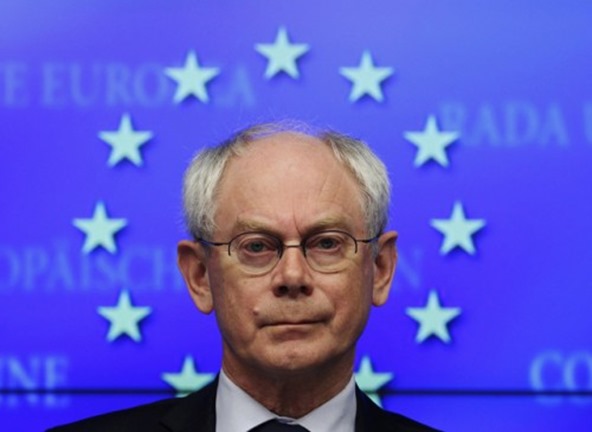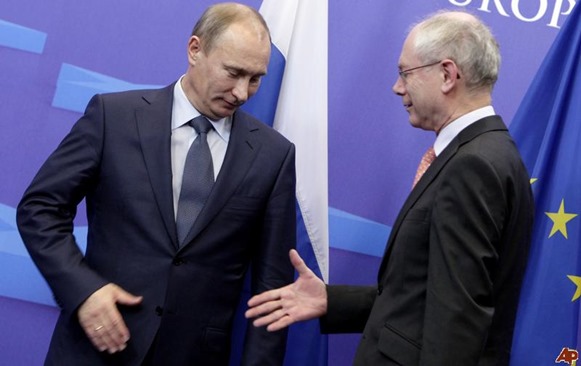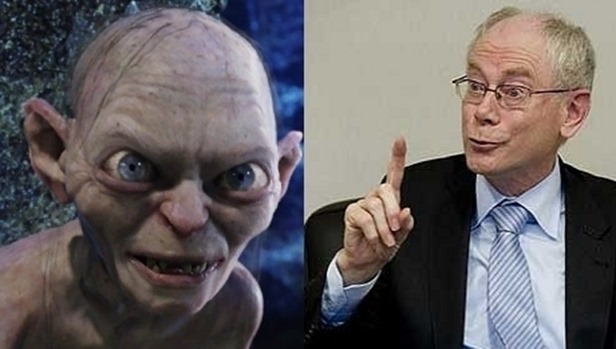Breitbart
May 2, 2014

In a crass and ill-timed intervention, the unelected president of the European Council Herman Van Rompuy has warned Vladimir Putin that the EU intends ultimately to control every country on the western flank of Russia.
In an interview with De Standaard newspaper, Van Rompuy speaks about his “dreams” that all the Balkan states will join the EU. He calls it an “inspiring thought” that in the long term “the whole of European territory outside Russia” will be tied in some way to the EU.
He admits he does not know if there is public support for such a move, “But we do it anyway.”
Van Rompuy’s comments, released in the midst of the tensions which have followed moves by Brussels to put Ukraine on the path to EU membership, give credence to Putin’s fears that ultimately the EU intends to put its tanks on Russia’s lawn.
Building a common EU defence is one of the strategic priorities for the Brussels elite who are trying to build “a country called Europe.”
Most people in Britain are unaware of it, but a commitment by Britain and the other member states to common foreign, security and defence policies was written into the Maastricht Treaty of 1992.
In recent years the EU has deepened the integration of the military forces of member states with the framing of the Common Security and Defence Policy.
German Chancellor Angela Merkel and French President Francois Hollande are the leading voices for a common defence force for the EU.
In 2008, a report by a respected Dutch think tank warned that the EU is pursuing a secretive “military space policy.” It accused the EU of using the cover of the European Space Agency to develop technologies such as the Galileo satellite system for use by military as well as civilian. authorities
Last July, Martin Schulz, the German socialist President of the European Parliament who is now one of the top candidates to be the next president of the European Commission, said: “We need a headquarters for civil and military missions in Brussels and deployable troops.”
At the same time the European Commission proposed that it should “own and operate” its own surveillance drones.

Last December at a European Council meeting, member states agreed to “deepen defence cooperation.” At a press conference afterwards, David Cameron insisted Britain would block EU institutions from owning and operating their own military assets.
However, the fact is there is nothing Britain can do to stop a group of EU member states from creating their own “intergovernmental” defence force and asking the EU to administer it.
Now in this latest interview, Van Rompuy has said Brussels intends in effect to create an EU national border from the Arctic Circle to the Turkish border with Iraq.
This could threaten Russia’s historic, trade and political ties with Eastern Europe, so it is unlikely Russians will believe Van Rompuy when he insists the EU does not intend to create a “geopolitical shift.”
As long ago as 2007, José Manuel Barroso, the Portuguese former Maoist who is the president of the European Commission, said he liked to compare the EU “to the organisation of an empire.” He said “We have the dimension of an empire. I believe it is a great construction.”
Van Rompuy’s interview makes it clear that the EU elite intend for the empire to go right to the edge of the Russian Motherland.
In reply to Van Rompuy’s interview, a spokesman for the Foreign and Commonwealth Office said: “Europe’s diversity means a one-size-fits-all Europe will not work. You cannot impose a federal, close-knit union on such a varied group of states. There is not the political will to do so.”
“Only 31 per cent of the people across the European Union have a positive view of the EU. Two-thirds believe their voice does not count in the EU. This is not the voice of people who think a ‘United States of Europe’ is the answer to their problems. You have to treat Europe like a network not like a bloc.”
UKIP deputy leader Paul Nuttall said Van Rompuy’s words “demonstrate the frightening expansionist mentality of federalist fanatics.” He said Van Rompuy “does show a rare glimpse of honesty when he admits that the EU’s desire to expand comes without any public approval.”
Vladimir Chizhov, Russian ambassador to the EU, and Douglas Alexander, Labour’s Shadow Foreign Secretary, were both unavailable for comment.

